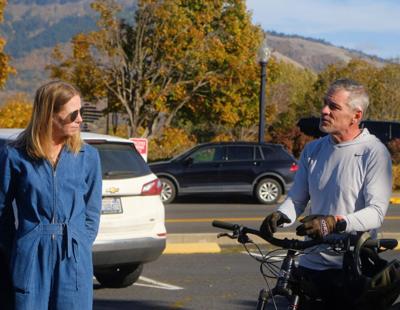THE GORGE — A familiar debate over who should be allowed to ride electric bicycles in Oregon is picking up speed again — this time, on two wheels and with a focus on kids.
On Oct. 29, Megan Ramey, vice chair of Columbia Area Transit and a member of the Oregon Micromobility Network, invited local and state leaders to join her and state Rep. Jeff Helfrich (R–The Dalles) in Mosier for a Policy Makers E-Bike Ride.
The rides, now in their fourth year, brings policymakers together to experience firsthand what e-bike advocates say could be a cornerstone of Oregon’s clean transportation future — if state law would let more young riders participate.
“Four years ago … I had the privilege of helping the Oregon Environmental Council organize a series of e-bike rides for policymakers across the state,” Ramey said in an email to Uplift Local.
She recalled that the event in Hood River was particularly successful: The weather was cooperative and former Mayor Kate McBride and former county commission Chair Mike Oates were so impressed that they purchased e-bikes the following month.
Now, Ramey wants even more people to share the e-bike experience.
Oregon law currently prohibits kids under the age of 16 years old from operating e-bikes on public roads, a restriction that Ramey and others believe no longer fits the realities of how young people move around their communities. It’s also at odds with Washington’s laws, which allow children under 16 to legally ride some e-bikes.
Ramey said Oregon’s age restriction hasn’t stopped middle schoolers from riding e-bikes throughout the Columbia River Gorge. She sees it every day — kids, including her own daughter, using them to commute to school, visit friends, or travel to after-school activities independently.
“My daughter recently turned 16 and has been ‘illegally’ riding an e-bike for four years,” Ramey said. “We jokingly celebrated her newfound ‘legal’ status on her birthday. Despite now being old enough to drive a 10,000-pound vehicle, she much prefers her 50-pound e-bike.”
While the Oregon law requiring e-bike riders to be 16 remains on the books, enforcement is minimal. There is no specific penalty for minors riding e-bikes, and most police departments handle incidents at their discretion.
“Violations of traffic law are handled on a case-by-case basis,” said The Dalles Police Chief Tom Worthy. ”Officers use discretion and judgment about whether or not to issue a citation or warning, especially where juveniles are concerned.”
He said officers might issue warnings, contact parents, or provide safety guidance, but have not seen a rise in complaints or crashes involving minors on e-bikes.
“E-bikes are certainly more prevalent now than ever,” Worthy said. “We encourage safe use and advise drivers to be on the lookout for bikes, pedestrians and motorcycles. Safety is our overall objective.”
Worthy added that lowering the age limit wouldn’t likely change much about how officers handle these interactions, at least in The Dalles.
“It would not make any difference one way or another,” he said. “We strive to generate voluntary compliance through enforcement and education.”
For advocates like Ramey, that lack of enforcement shows the law is outdated.
In 2022, she wrote a blog post titled “Dawn of the Throttle Kids” urging legislators to consider that many kids are already riding e-bikes despite the ban, and parents often welcome it because it allows children to get around without depending on them for rides.
“The popularity of e-bikes is growing,” she told Uplift Local. “Kids in the Gorge are riding them even though it’s technically illegal. There’s no real enforcement to stop them, and the e-bikes allow these kids to have some independence to get to and from places on their own without turning mom and dad into their taxi driver.”
She believes e-bikes represent more than a youth mobility issue — they’re part of a cultural shift away from car dependency.
Many cities in both Oregon and Washington have enacted additional local rules when it comes to e-bikes, depending on their features. Some engage an electric motor only while being pedaled. Others allow the operators to move forward without pedaling, by using a throttle to engage the motor.
Ramey agrees that safety is a real concern, but she argues that infrastructure, not age limits, is the problem.
“My top two challenges are the lack of safe bikeways for teaching young people and Oregon’s outdated e-bike laws,” she said.
As an educator and advocate — she was named Educator of the Year by the League of American Bicyclists in 2024 — Ramey sees the potential for e-bikes to help kids develop lifelong habits around sustainable transportation.
“From what I’ve seen, one of the most interesting new challenges with e-bikes is how teens and tweens have flocked to them,” she said. “Teens getting around town by e-bike instead of a car is a wonderful thing. We lovingly call them ‘throttle kids’ because they seem to prefer the Class 2 bikes that can be powered by a throttle without any pedaling at all.”
Ramey added that e-bikes represent the potential for a generation of kids to envision a life of getting around their communities in something other than a car or bus for short trips.
“We’re not just talking about bikes,” Ramey said. “We’re talking about independence, equity, and climate-smart mobility. Giving kids the freedom to ride safely is something Oregon should lead on.”
She said she’s optimistic that legislators who experience e-bikes firsthand will better understand their potential — and hopes last week’s ride in Mosier will help crank up bipartisan support for 2026 legislation to make it legal for young Oregonians to ride an e-bike.
•••
Ken Park grew up in the Columbia River Gorge and has worked in journalism on and off for about 10 years. Read full notes by Documenter Jinlu Yuan from the Hood River County Transportation (CAT) District Oct. 15 board meeting at columbia-gorge.documenters.org.






















Commented